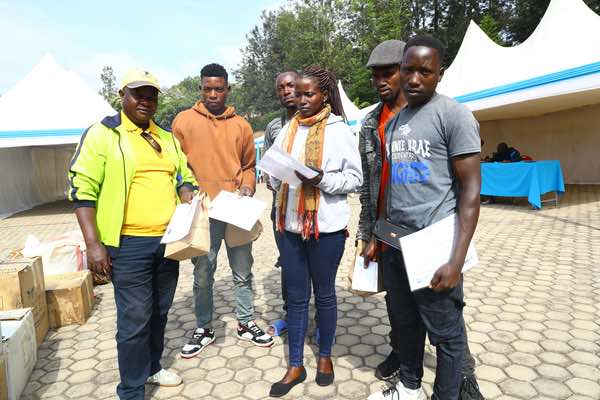
Burundians at the departure site in Kigali before returning home. ©UNHCR/Eric Didier Karinganire
As of October 2022, UNHCR has facilitated the voluntary repatriation of 30,317 Burundian refugees from Rwanda since August 2020. They ask for continued assistance to rebuild their lives back home.
Burundian refugees who have been living in Rwanda over the last seven years continue to express their willingness to return home as Burundi becomes more peaceful.
Venant Niyonzima sought refuge in Rwanda after fleeing violence in Burundi six and a half years ago. In late October 2022, he decided to return home as tensions ease in his country of origin.
“I am returning home to leave behind my refugee status and regain my name as a Burundian citizen so that I can work for my country and support my family,” says the 49-year-old man as he gears up for boarding a bus from Kigali to Burundi via Nemba border. “I am now very excited to go back to my country to reunite with my family.”
When political violence broke out, Venant left behind his house, wife, children, and friends to seek safety. After years in exile, he heard that his country of origin is now safe and peaceful – which made him decide to return home.
“I want to check on the properties I left behind, see how to start rebuilding my life, and collaborate with those who are in the country in doing development activities and live with them peacefully,” he says.
Venant is among 219 Burundian refugees from Mahama camp and urban areas across Rwanda who, in late October, were facilitated by the UN Refugee Agency (UNHCR) and the government of Rwanda to voluntarily return home.
For Venant, he had been in contact with UNHCR to express his willingness to return home a couple of months previously. For UNHCR ensuring that refugees make informed and voluntary decisions to return home is imperative, once this is clear, support is then provided to repatriate in safety and with dignity. In 2022, 12 convoys have taken place taking refugees back to Burundi.
Like Venant, Egide spent five years in Rwanda before deciding to go back home.
According to Egide, returning home is a significant moment for him not only for reconnecting with his native country but also for showing his one-year and eight-month firstborn Judicael the land of his ancestors for the very first time.
“Nothing is better than having a country you can call home,” the 35-year-old father says as he, his wife, and their little son wait to board a bus heading to Burundi. “I am now amazed to go back to my country because it’s painful to be a refugee.”
As an urban refugee, Egide used to earn his living by teaching French language but living conditions became harder when his job stopped due to COVID-19 pandemic.
As he returns home, he says, more support is needed to start over and rebuild his life.
“Once I manage to get seed capital, I would possibly start a small shop or do any other trading,” Egide says, adding that his dream is to secure a better future for his children by providing them with a decent education.
Aisha also shares the same views as Egide. Although she initially would like to get assistance in terms of shelter, food, and money to start a business and reintegrate herself well, she’s eager to work hard and take care of her four children.
“I am ready to do any job when I return home, but I can’t be precise now since it’s been a long time since I was there, and I don’t know the reality of the country’s progress,” she points out.
Since August 2020, UNHCR has facilitated the voluntary repatriation of 30,317 Burundian refugees from Rwanda through 63 convoys thanks to support from donors such as EU Humanitarian Aid. In addition, UNHCR in collaboration with the Government of Rwanda also supported the repatriation of 5097 Burundian refugees from Uganda since August 2021 – out of these, 3714 were supported this year.
Currently, Rwanda hosts more than 50,000 Burundian refugees, most of them live in Mahama camp – the biggest refugee camp in the country. Next year, UNHCR is planning a survey to analyze their intentions to return and see what the barriers are currently preventing them from going back home. [ Source UNHCR Rwanda ] (End)
